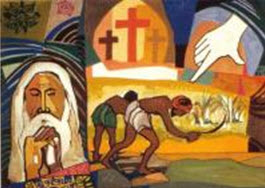

The Lord’s Prayer
Our first posting is from Rob Des Cotes. I have been privileged to be at one of Rob’s wonderful weekend retreats. Rob is a spiritual director, retreat leader and pastor of Fairview Baptist Church in Vancouver, B.C. He also directs Imago Dei, a network of faith communities that encourages the practice of prayer and a transforming relationship with God. He is the author of three books of meditations for spiritual direction, Fan the Flame, Higher Than I and Ultreia! (Go Higher). This posting was written for a whole week, beginning on a Monday. You will have four days to go through this, starting today, Sunday, in order to have a taste of ‘Lectio Devina’ using the Lord’s Prayer.
New Years blessings to each one of you!
Praying the Lord’s Prayer
Lord, teach us to pray. Luke 11:1
The Lord responded to this request by teaching His disciples what we now call “the Lord’s Prayer.” Ever since, these words have become the central utterance of the historical church. They are words that we are meant to embody as our first concerns of life. It is a beautiful prayer to recite, but it is in living each of these petitions that the power of these words becomes rooted in our thoughts, attitudes, actions and desires. Through these words we line up our desires with those of our Lord.
I have longed to shape my life according to this prayer and have been helped by a simple format that might serve you as well. Whenever I have tried to meditate on the various petitions during a single prayer time I have always found it overwhelming. Each verse is a lectio divina of its own. But the Lord’s Prayer can easily be walked through on a weekly basis, focusing on one meditation each day. A relationship with the Lord’s Prayer over the course of a week could look like this:
Monday: “Our Father who art in heaven, hallowed be thy name”
- consider today the many ways God nurtures us
- consider how the word our presumes a relationship with God that is a shared one
- meditate on the fact that, though God is with us and within us, He is also high above us. He is both immanent and transcendent
- consider your relationship to a God whose name is hallowed, holy
Tuesday: “Thy kingdom come, thy will be done on earth as it is in heaven”
- meditate on the need for change in the world
- consider the difference it will make and desire the day when every person will know the Lord for themselves. (Jer. 31:34)
- rejoice at the hope of everything being as it should; imagine the unity of agreement between heaven and earth, and among all people
Wednesday: “Give us this day our daily bread”
- it is half way through the week; pray for the conditions of your home or work place
- meditate on your circumstances, whether in need or in plenty, and consider all to be from God’s hand
- give thanks to God for the needs you do have; see yourself among those who are blessed because you hunger God-ward.
Thursday: “Forgive us our trespasses”
- the week now turns towards Sunday when you will once again meet the Lord in communion; it is time to “prepare the way of the Lord”
- spend time today taking stock of your life; confess all that represents a trespass of God’s loving desire for your life
- consider the ways your life has either intentionally or inadvertently worked against God’s purposes in you, and in your relationship with others
- be grateful for the confidence you have in asking for forgiveness; and for the assurance you have that you will receive it
Friday: “as we forgive those who trespass against us”
- Friday, in many Christian traditions, is considered a day of mercy since it was the day the Lord gave His life for us. As we have freely received mercy when we asked for it yesterday, today we consider all those who offend us as we pray for the faith to forgive them
- as Christ does for you, present others to yourself as “spotless, without blemish” (Eph. 5:27)
- forgive yourself also, for all the ways you think you fail in your own eyes
Saturday: “And lead us not into temptation but deliver us from evil”
- Saturday, in most Christian traditions, is seen as a day of waiting, as it lies between Good Friday and Resurrection Sunday
- in the days preceding, you have asked for and have received forgiveness. Jesus now says to us, “go and sin no more.” Today is a day when you strive to remain in His love, clean because of the grace you have received from His hand
- let us not underestimate the daily help we need in order to continually walk in righteousness
Sunday: “For thine is the Kingdom, the power and the glory forever and ever, Amen.”
- the Lord’s Day is a day of victory that affirms God’s rule over sin and death
- we meditate on eternity, when God’s glory will no longer be seen dimly, but will be fully recognized by all
- rest in the confidence that God’s sovereign power will achieve all that He has promised.







